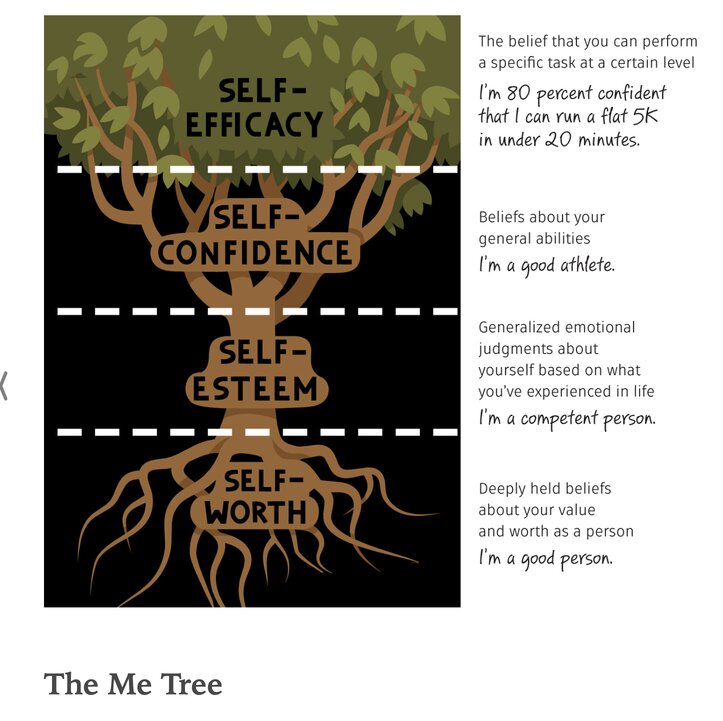In their book, The Brave Athlete: Calm the F*ck Down and Rise to the Occasion, sports psychologist Dr. Simon Marshall and his wife, World Triathlon Cross Championships Lesley Paterson, describe our self-judgment system using a tree metaphor. The tree comprises a deep root (self-worth), a sturdy trunk (self-esteem), a thick branch (self-confidence) and leaves (self-efficacy).
Our self-judgment systems are hierarchical. The deeper the problem, the more you’re f*cked.

Self-worth – deep roots.
Your self-worth is based on deeply held feelings about your value and worth as a person. It is not about what you do but who you are—your values, morals, passions, and fundamental beliefs about yourself. The extent to which your emotional and psychological needs were met as a kid largely determines your self-worth.
From a young age, we start to express psychological and emotional needs that we are highly motivated to meet: the need for love, security, safety, affirmation, belonging, and so on. If these needs are not met, we try to figure out why. Because our young brains are not capable of analyzing the causes logically and exhaustively, our focus often turns inward. We start to blame ourselves, and the conclusions we settle on are pretty damning: We are not good enough, not worthy enough, not competent enough, and so on. After all, why else would we not get attention, get rejected, or not feel encouraged or protected?
The end result is usually the same: I must be a bad person of little value. The seeds of low self-worth take root. These biased beliefs grow and infect our adult brain like viruses.
A healthy self-worth means that you know your life is valuable and important and that you are loveable. Because self-worth is a relatively stable characteristic of our personality and it affects virtually every self-perception we have, changing it often requires the help of a mental health professional.
Self-esteem – sturdy trunk
Self-esteem is the trunk of the tree because it supports everything above it. Just as a bad root system (low self-worth) can’t create a healthy tree trunk (self-esteem), strong self-esteem is required to support self-confidence (the tree branches). It’s extremely rare to find athletes who are supremely confident but have low self-esteem.
Self-esteem reflects generalized emotional judgments about yourself based on what you believe you’ve experienced, achieved, or accomplished. These “achievements” can be real and tangible (e.g., you’ve done well at school, at work, in sports, etc.) or they can be imagined (e.g., you’ve been told that you’re successful).
Self-confidence – thick branches
Because self-confidence is defined by your perception of your ability, it has a future orientation and predicts what things people will attempt. Self-confidence is the first area in which your self-judgment system can appear differentiated, meaning that you can have strong and weak branches on the same tree. You can have high self-confidence in one area of your life but low self-confidence in another area.
“Even though low confidence can affect other aspects of your life, it rarely affects everything if your underlying self-esteem (tree trunk) is healthy. When you lack self-confidence across the board, the problem is most likely low self-esteem.”
Self-efficacy as leaves
Self-efficacy is a task-specific form of confidence. Technically speaking, self-efficacy refers to your beliefs about your capability of producing a very specific level of performance. Because self-efficacy is situation specific, your confidence to execute a given task may vary depending on the circumstances.
“Self-efficacy is about what you think you can do in very specific tasks, not what you can actually do.”
All the best in your quest to get better. Don’t Settle: Live with Passion.



Comments are closed.